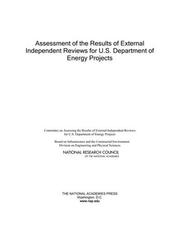| Listing 1 - 6 of 6 |
Sort by
|
Book

ISBN: 1282451219 9786612451218 0833048651 0833045105 9780833048653 9780833045102 9781282451216 6612451211 Year: 2008 Publisher: Santa Monica, CA RAND Corp.
Abstract | Keywords | Export | Availability | Bookmark
 Loading...
Loading...Choose an application
- Reference Manager
- EndNote
- RefWorks (Direct export to RefWorks)
The government, as a principal, may seek to induce a private investor, as an agent, to build and operate an unconventional-oil production plant to promote early production experience with such plants. Given this goal,facing significant uncertainty about the future, the government wants to limit the cost to the public treasury of doing this. This report offers an analytic way to design and assess packages of policy instruments that the government can use to achieve its goal. It starts with general principles of the economic theories of contracting and agency. Looking across many alternative futures he
Coal liquefaction --United States. --- Energy development --United States. --- Federal aid to energy development --United States. --- Coal liquefaction --- Federal aid to energy development --- Energy development --- Chemical Engineering --- Chemical & Materials Engineering --- Engineering & Applied Sciences --- Coal --- Coal hydrogenation --- Liquefaction of coal --- Liquefaction --- Hydrogenation --- Liquid fuels --- Petroleum, Synthetic

ISBN: 0309106397 9786610844319 1280844310 0309106400 9780309106405 9780309106399 0309179815 Year: 2007 Publisher: Washington, DC National Academies Press
Abstract | Keywords | Export | Availability | Bookmark
 Loading...
Loading...Choose an application
- Reference Manager
- EndNote
- RefWorks (Direct export to RefWorks)
Energy development - United States - Management - Evaluation. --- Energy development --- Peer review --- Industries --- Business & Economics --- Evaluation --- Management --- Energy policy --- Planning --- Evaluation. --- United States. --- Energy and state --- Power resources --- State and energy --- Government policy --- D.O.E. (Department of Energy) --- DOE (Department of Energy) --- Industrial policy --- Energy conservation
Book
ISBN: 9781603585385 9781603583718 1603583718 1603583726 1603585389 Year: 2011 Publisher: White River Junction (Vermont) Chelsea Green Publishing
Abstract | Keywords | Export | Availability | Bookmark
 Loading...
Loading...Choose an application
- Reference Manager
- EndNote
- RefWorks (Direct export to RefWorks)
Oil and coal have built our civilization, created our wealth, and enriched the lives of billions. Yet, their rising costs to our security, economy, health, and environment now outweigh their benefits. Moreover, that long-awaited energy tipping point?where alternatives work better than oil and coal and compete purely on cost?is no longer decades in the future. It is here and now. And it is the fulcrum of economic transformation.A global clean-energy race has emerged with astounding speed. The ability to operate without fossil fuels will define winners and losers in business?and among nations.In Reinventing Fire, Amory Lovins and Rocky Mountain Institute offer a new vision to revitalize business models, end-run Washington gridlock, and win the clean-energy race?not forced by public policy but led by business for enduring profit. This groundbreaking roadmap reveals market-based solutions across the transportation, building, industry, and electricity sectors. It highlights pathways and competitive strategies for a 158%-bigger 2050 U.S. economy that needs no oil, no coal, no nuclear energy, one-third less natural gas, and no new inventions.This transition would cost $5 trillion less than business-as-usual?without counting fossil fuels? huge hidden costs. It requires no new federal taxes, subsidies, mandates, or laws. The policy innovations needed to unlock and speed it need no Act of Congress.Whether you care most about profits and jobs, national security, health, or environmental stewardship, Reinventing Fire charts a pragmatic course that makes sense and makes money. With clarity and mastery, Lovins and RMI point out the astounding opportunities for enterprise to create the new energy era.Drawing praise President Bill Clinton, former National Security Advisor Robert McFarlane, and a host of others, Reinventing Fire has piqued the interest of world leaders, business leaders, and political strategists.The paperback will carry a new preface detailing the response from China and beyond.Bron : http://www.amazon.com
Energy development --- Renewable energy sources --- Energy consumption --- Energy policy --- Industries --- Energy conservation --- Energie --- Energiesector --- Duurzame energie --- Alternatieve energie --- Managementmodellen --- Verenigde Staten --- Energiebeleid --- Managementmodel --- Belasting (fiscaal) --- Energy development - United States --- Renewable energy sources - United States --- Energy consumption - United States --- Energy policy - United States --- Industries - Energy consumption - United States --- Industries - Energy conservation - United States

ISBN: 0080208738 9780080208732 Year: 1976 Publisher: New York (N.Y.): Pergamon
Abstract | Keywords | Export | Availability | Bookmark
 Loading...
Loading...Choose an application
- Reference Manager
- EndNote
- RefWorks (Direct export to RefWorks)
Energy policy --- Energy development --- Politique énergetique --- Energie --- Environmental aspects --- Développement --- -Energy policy --- -620.9 --- 614.7 --- 351.777 --- 620.9 --- Energy and state --- Power resources --- State and energy --- Industrial policy --- Energy conservation --- Energy resources development --- Energy source development --- Power resources development --- -Economics of energy in general --- Government policy --- 620.9 Economics of energy in general --- Economics of energy in general --- Politique énergetique --- Développement --- Energy policy - United States --- Energy development - United States --- Energy policy - Environmental aspects - United States
Book
ISBN: 1280126892 9786613530752 0833059211 0833059181 9780833059215 9780833059185 9781280126895 6613530751 Year: 2011 Publisher: Santa Monica, CA RAND
Abstract | Keywords | Export | Availability | Bookmark
 Loading...
Loading...Choose an application
- Reference Manager
- EndNote
- RefWorks (Direct export to RefWorks)
To determine whether the industrial base for the U.S. domestic coal-based electricity generation industry can maintain the capability to design, construct, operate, and maintain coal-fired electricity generating units within reasonable cost, schedule, performance, environmental, and quality expectations, this book reviews interviews with stakeholders and data describing key elements of industry capability and validation or verification of concerns.
Coal-fired power plants -- United States -- Forecasting. --- Coal-fired power plants -- United States. --- Electric power production -- United States. --- Energy development -- United States. --- Energy policy -- United States. --- Coal-fired power plants --- Electric power production --- Energy development --- Energy policy --- Electrical & Computer Engineering --- Engineering & Applied Sciences --- Electrical Engineering --- Forecasting --- Illegal immigration. --- Children of illegal aliens --- Illegal alien children --- Illegal aliens --- Irregular migration --- Unauthorized immigration --- Undocumented immigration --- Women illegal aliens --- Emigration and immigration --- Human smuggling --- Noncitizen detention centers
Book
ISBN: 0674419618 0674728890 9780674419612 9780674728899 9780674970922 Year: 2014 Publisher: Cambridge, MA
Abstract | Keywords | Export | Availability | Bookmark
 Loading...
Loading...Choose an application
- Reference Manager
- EndNote
- RefWorks (Direct export to RefWorks)
The fossil fuel revolution is usually rendered as a tale of historic advances in energy production. In this perspective-changing account, Christopher F. Jones instead tells a story of advances in energy access--canals, pipelines, and wires that delivered power in unprecedented quantities to cities and factories at a great distance from production sites. He shows that in the American mid-Atlantic region between 1820 and 1930, the construction of elaborate transportation networks for coal, oil, and electricity unlocked remarkable urban and industrial growth along the eastern seaboard. But this new transportation infrastructure did not simply satisfy existing consumer demand--it also whetted an appetite for more abundant and cheaper energy, setting the nation on a path toward fossil fuel dependence. Between the War of 1812 and the Great Depression, low-cost energy supplied to cities through a burgeoning delivery system allowed factory workers to mass-produce goods on a scale previously unimagined. It also allowed people and products to be whisked up and down the East Coast at speeds unattainable in a country dependent on wood, water, and muscle. But an energy-intensive America did not benefit all its citizens equally. It provided cheap energy to some but not others; it channeled profits to financiers rather than laborers; and it concentrated environmental harms in rural areas rather than cities. Today, those who wish to pioneer a more sustainable and egalitarian energy order can learn valuable lessons from this history of the nation's first steps toward dependence on fossil fuels.
Energy consumption -- United States -- History. --- Energy development -- United States -- History. --- Energy policy -- United States -- History. --- Power resources -- United States -- History. --- Transportation -- United States -- History. --- Energy policy --- Energy development --- Power resources --- Energy consumption --- Transportation --- Business & Economics --- Industries --- History --- History. --- Consumption of energy --- Energy efficiency --- Fuel consumption --- Fuel efficiency --- Energy --- Energy resources --- Power supply --- Energy resources development --- Energy source development --- Power resources development --- Energy and state --- State and energy --- Government policy --- Energy conservation --- Natural resources --- Energy harvesting --- Energy industries --- Industrial policy --- E-books --- History of North America --- anno 1800-1899 --- anno 1900-1909 --- anno 1910-1919 --- anno 1920-1929 --- United States --- United States of America
| Listing 1 - 6 of 6 |
Sort by
|

 Search
Search Feedback
Feedback About UniCat
About UniCat  Help
Help News
News